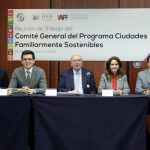


Mental Health in Families
Inclusive and resilient recovery from COVID-19
Thursday, February 10th, 2022
Virtual Room

Co-organized by the Permanent Mission of the Republic of Botswana to the United Nations and the UN-DESA Division for Inclusive Social Development.

#IFFDBriefing #IFFDAwards
Since March 2020, life has changed radically for parents of children under 18, often in the face of worsening poverty. Not only have they had to deal with the universal pandemic disruptions on their work and social lives, but also grapple with the pandemic’s impact on their children. According to the American Psychological Association, nearly half of parents in the United States said the level of stress in their life has increased compared with before the pandemic.
Now more than ever, mental illnesses in parents represent a risk for children in the family, especially in the context of an inconsistent, unpredictable family environment. Mental illness of a parent can put stress on the marriage and affect the parenting abilities of the couple, which in turn can harm the child. We need to reimagine the support we give to parents so that they have the time, resources and services to give children the best start in life. Family relationships can substantially affect mental health, behavior and even physical health. Numerous studies have shown that social relationships, particularly family relationships, can have both long- and short-term effects on one’s mental health. Depending on the nature of these relationships, mental health can be enhanced or impacted negatively.
To provide evidence about this issue, some of the most recent and prestigious studies were presented by their authors in this year’s edition of the IFFD Briefing. The IFFD Awards were also focused on the help given to families in vulnerable situations, especially the young generations who have to struggle in the middle of the pandemic to start a family through a decent job, adequate housing and social protection.
Programme
Welcoming Remarks

H. E. Ishmael T. Dabutha
Deputy Permanent Representative of Botswana to the United Nations
Interactive Discussion
Evidence-based Policy Recommendations

Senior Policy Analyst at the Kaiser Family Foundation Program on the A C A and the Program on Medicaid and the Uninsured, Washington, DC

Assistant Professor of Psychiatry and Director for Pediatric Integrated Behavioral Healthcare at the Boston University School of Medicine / Boston Medical Center

Alison Richman Professor for Children and Families at the University of Maryland
President of the Zero To Three Board of Directors
Moderator

Associate Professor at the
University of Minnesota,
Department of Family Social Science
More Documentation
- Mental Illness in Families (American Academy of Child and Adolescent Psychiatry)
- Support Parenting (UNICEF)
- Caregiving in a Pandemic: Mental Health Challenges for Parents (UNICEF USA)
- Family and Parenting Support (UNICEF USA)
- Loneliness and mental health at the early stages of the Covid-19 pandemic in England
IFFD Family Awards Ceremony
To the Polish Region of
Kujawsko-Pomorskie

Reading of the Award Decision by
Vice-president of IFFD
Acceptance and Appreciation
President of the Kujawsko-Pomorskie Region
To the French organization
Familya

Reading of the Award Decision by
Vice-president of IFFD
Acceptance and Appreciation

President and Founder of Familya
Closing Remarks

Focal Point of the Family, United Nations Division for Inclusive Social Development
at the Department of Economic and Social Affairs
Conducted by

Communication Officer
Rotterdam University of Applied Sciences
Member of the IFFD Academic Training Program
Background Note
The recently adopted resolution on the preparations for and observance of the thirtieth anniversary of the International Year of the Family encourages Member States to invest in family-oriented policies and programmes. Among those efforts, parenting education has proven to be especially effective for social cohesion while improving strong intergenerational interactions, social cohesion and mental health for all family members.
COVID-19 and its socio-economic consequences have added novel forms of stress on parents and aggravated pre-existing vulnerabilities within families. For almost two years of the pandemic, parents continue to struggle to keep children learning and their families functioning, often in the face of increasing poverty. Usually, parents are pushed to balance their responsibilities for child care and teleworking, with a disproportionate burden placed on women. The repercussions contribute to a devastating mental health crisis affecting families and young people.
As UNICEF USA has mentioned, the Lancet Commission estimated “15 to 23 percent of children around the world live with a parent with a mental disorder.” We are certain that children can only thrive and flourish when they feel safe and protected, when family, caregiver and community connections are stable and when their basic needs are met. We are urged to support evidence-based parenting programs, mental health services for parents and family-friendly policies. All have proven to be accelerators to drive change across multiple child life outcomes. The pandemic has highlighted the importance of nurturing care and parenting for better children, families and societies.
Discussion Points
1.- How can the Public and Private Sector support new parents in terms of mental health, especially after giving birth?
2.- How can parents be supported in their work-family balance struggle while teleworking and educating children?
3.- How can parents be helped in fulfilling their social role, especially mothers, so that families can shelter their vulnerable members in the most appropriate way?
4.- What are the most effective protective factors that can decrease the risk to children: the knowledge that their parent(s) is ill and that they are not to blame; help and support from family members; a stable home environment; psychotherapy for the child and the parent(s); a sense of being loved by the ill parent; a naturally stable personality in the child, positive self-esteem; inner strength and good coping skills in the child; a strong relationship with a healthy adult; friendships, positive peer relationships; interest in and success at school; healthy interests outside the home for the child; help from outside the family to improve the family environment (for example, marital psychotherapy or parenting classes)?
The IFFD Briefing has been held at the UN Headquarters in New York for the
past ten years during the Session of the Commission for Social Development.
The IFFD Family Awards are also presented during the event to the
persons or territories distinguished by the promotion of family values.
This programme is subject to change without prior notice.












